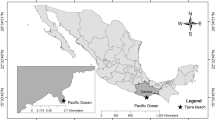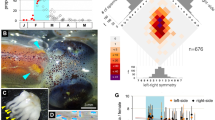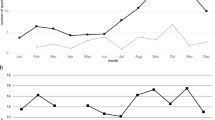Abstract
THE American slipper limpet, Crepidula fomicata, which is a protandric hermaphrodite mollusc1 usually occurring in piles or chains of two to as many as nineteen individuals, and where the older individuals in the chain are female and the younger top ones male, has recently2 frequently been found solitary and in spawn in deep water in Lyme Bay, from off Sidmouth to off Slapton.
This is a preview of subscription content, access via your institution
Access options
Subscribe to this journal
Receive 51 print issues and online access
$199.00 per year
only $3.90 per issue
Buy this article
- Purchase on Springer Link
- Instant access to full article PDF
Prices may be subject to local taxes which are calculated during checkout
Similar content being viewed by others
References
Orton, J. H., Proc. Roy. Soc., B, 81, 468 (1909).
Orton, J. H., Proc. Mal. Soc., 28, 182 (1950).
Orton, J. H., J. Mar. Biol. Assoc., 10, 322 (1914).
Coe, W. R., J. Exp. Zool., 108, 168 (1948).
Hsiao, S. C., Biol. Bull., 76, 280 (1939).
Crisp, D. J., Nature, 166, 311 (1950).
Author information
Authors and Affiliations
Rights and permissions
About this article
Cite this article
ORTON, J. Protandry with Self-Fertilization in the American Slipper Limpet, Crepidula Fornicata. Nature 169, 279–280 (1952). https://doi.org/10.1038/169279a0
Issue Date:
DOI: https://doi.org/10.1038/169279a0
This article is cited by
Comments
By submitting a comment you agree to abide by our Terms and Community Guidelines. If you find something abusive or that does not comply with our terms or guidelines please flag it as inappropriate.



